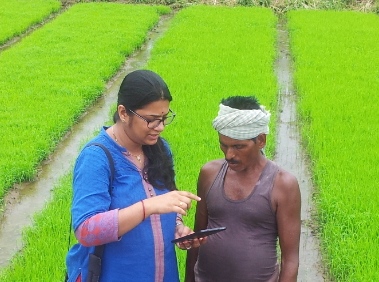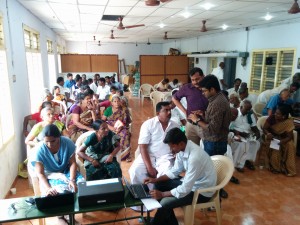Smart Tools for Farmers in South Asia to Help Increase Yield

To produce food for more people using less land and under more difficult climatic conditions, many studies predict that the use and demand for fertilizers will continue to rise in South Asia. By 2020, fertilizer demand in India is projected to increase to about 41.6 million tons from 26.4 million tons in 2010. However, fertilizer use by farmers in India is often insufficient and applied inefficiently, leading to sub-optimal yields. As demand for fertilizers rise, it is important to ensure that they are applied at the right amounts, at the right time and in the right locations to enhance productivity and increase crop yields.
In South Asia, 90 percent of smallholder farmers who use fertilizer lack access to soil testing services. Due to blanket fertilizer recommendations provided over a wide area, the application of nutrients is often not well matched to the requirement of the soil and crop. Also, excessive, non-judicious and imbalanced use of chemical fertilizers can result in the deterioration of soil fertility. This is becoming a cause for concern for Indian agriculture. According to a study published in the Journal of the Environment, Development and Sustainability, India is losing soil 30 to 40 times faster than its natural replenishment rate. The solution lies in part in having a precise, site-specific nutrient management approach that will build sustainable and profitable agriculture sector.
The Cereal Systems Initiative for South Asia (CSISA), in collaboration with International Rice Research Institute (IRRI) and state universities and government partners, are developing localized versions of the ‘Crop Manager’ decision-making tool to provide location-specific fertilizer recommendations for farmers growing rice and maize in Odisha, and rice-wheat and maize in Eastern Uttar Pradesh and Bihar. In the Cauvery Delta of Tamil Nadu, a version of ‘Rice Nutrient Manager’ has been developed by CSISA to support and complement the existing crop management advisory services of the State government. The partners are in the advanced field testing phase and are fine-tuning the tools prior to official release.
Crop Manager is an expanded version of Nutrient Manager, first conceptualized and released by IRRI in the Philippines in 2009. Crop Manager combines improved nutrient management with field-specific best-bet crop management guidelines to address three to four of the main agronomic constraints in addition to fertilizer recommendations.
Fast and Futuristic
The tool includes both web-based and mobile Android application with a simple, user-friendly interface providing personalized fertilizer guidance for small-scale farmers and extension workers. The farmer has to provide information about their fields by responding to a set of 12-15 brief questions about field location, planting method, seed variety, typical yields, choice of fertilizer, method of harvesting and other factors.
Based on these inputs, the program recommends how much fertilizers (nutrients nitrogen (N), phosphorus (P), and potassium (K)) should

CSISA scientists sensitizing the partners and farmers on Nutrient Manager for Rice in a workshop from 17-19 June in Thanjavur, Tamil Nadu.
be added at critical growth stages of the plant in order to increase yield and profit. The recommendation is given in the amount of fertilizer that farmer prefers to use and they can receive the advice instantly, if their mobile is connected to internet. The crop manager will be available in Hindi, Odiya and English. Interactive voice response (IVR) system to guide the user through this survey with a recorded questionnaire is also planned.
With mobile phone and internet penetrating fast in rural India – India has 110 million mobile internet users of which 25 million are in rural India – these ICT-based tools, especially in the future, will serve as a useful platform to take knowledge to the farmers easily and when they need it, said Sheetal Sharma, CSISA nutrient management specialist.
Aiming to increase a farmer’s income by US$100 per hectare per crop, the Rice Crop Manager was released in Bangladesh last year, as part of CSISA. Sharma further added that these ICT tools are based on strong scientific principles and show an edge over the traditional soil testing facilities, which usually take more time to give recommendations and require farmers to carry soil samples to a testing facility.
With the help of technologies like Crop Manager, CSISA hopes that farmers in South Asia will be able to replicate high-tech precision farming used in developed countries with easy-to-use and low-cost options. Farmers are able; they just need the right tools.
View the web-based Crop Manager tool, click here.
Watch Seminar on Rice Crop Manager by Roland Buresh, Principal Scientist in the Crop and Environmental Sciences Division, IRRI
Tags: crop manager, CSISA, ICT, IRRI, mobile, nutrient management, nutrient manager, Precision agriculture, south asia
